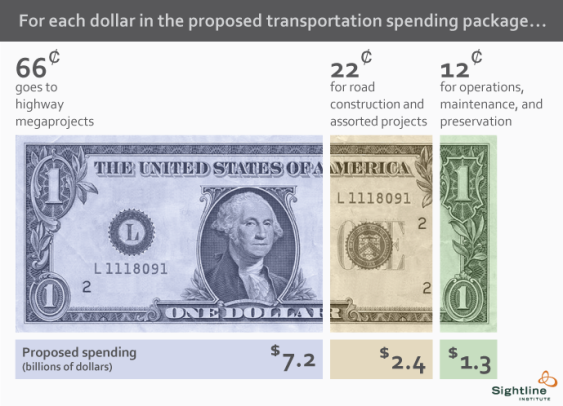Last Friday I complained that the transportation package currently being considered in Olympia elevates highways—and big, costly highway megaprojects in particular—above all of the state’s other transportation needs, from rail freight to transit to bike and pedestrian projects to protecting streams and rivers from the damage done by roads. Environmentalists should view it as a terrible deal.
But from the standpoint of fiscal responsibility, the House transportation package is also a bust: even as it splurges on new highways, the package offers only a pittance to maintaining and preserving the ones we’ve already built. Take a gander:
Anyone who’s taken a serious look at the issue thinks that the green bar represents just a small fraction of what’s required to maintain and preserve Washington’s transportation infrastructure. The Washington Roundtable, for example, thinks that the state needs to spend about 3 times as much on road preservation as this budget gives. And if we shortchange preservation now, it’ll be that much more expensive to fix things later. (A shovel in time saves nine…)
What makes this so galling is that transportation leaders consistently give lip service to road maintenance and repair. That’s probably because it polls so well: 88 percent of respondents in a recent survey said that maintaining and preserving existing roads was a “top” or “high” transportation priority, beating the pants off of every other option mentioned. And yet the House proposal would spend billions on new construction—and actually create an entirely new megaproject—even as it devotes just a fraction of what’s needed to maintain the roads we’ve already built.
The numbers tell the truth here: any attempt to call this a “fix it first” package is a brazen lie.
Graphic by GoodMeasures.biz.



Comments are closed.